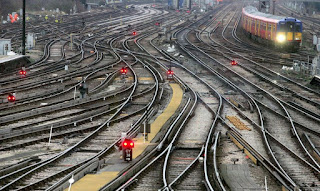N.J. Derailment Shows How Pain Persists for NYC Commuters By
Elise Young
October 5, 2018
Round-the-clock repairs at Pennsylvania Station were supposed to guarantee smoother New York City train commutes. They haven’t.
New Jersey Transit’s Montclair-bound Train 6279 went off the tracks Thursday at 6:20 p.m. near the Hudson River tunnel, where Amtrak last year oversaw $30 million of stepped-up maintenance after three trains derailed. Amtrak, which owns the Manhattan station and shares it with commuter railroads, “ruled out any issue with the infrastructure” after investigating the latest mishap, spokesman Jason Abrams said in an emailed statement.
NJ Transit expected no major delays for Friday evening’s rush hour. It was “looking into the possibility that an equipment issue with the train may have been a contributing factor,” spokeswoman Nancy Snyder said in an emailed statement.
The crumbling and century-old Hudson River tunnel provides the only New York City access for NJ Transit trains, and Amtrak has said it has less than 20 years of serviceable life. It’s key to the Boston-to-Washington Northeast Corridor route, serving an area that generates 20 percent of the nation’s gross domestic product. Amtrak’s proposed $30 billion Gateway project includes a second tunnel and other improvements, but President Donald Trump’s administration hasn’t pledged a federal cost share.
“Every time something like this happens, it’s a reminder of why we need another set of tunnels,” Stewart Mader, chairman of the Port Authority of New York and New Jersey Riders Council, said in an interview.
A tunnel power failure stranded about 1,600 passengers on two trains on Sept. 8. A moment after one re-started, a piece of metal, possibly displaced from the overhead electrical system, pierced the roof of one car. Amtrak this week said it was continuing to look for a cause.
NJ Transit described the Thursday incident as a “minor slow-speed train derailment” with no reported injuries. Some riders on social media described reaching their destinations as much as three hours late initially and on Friday morning.
Occasional passengers complained on Twitter about missing shows and family outings. Commuters, though, ranted about a week of unexpected delays heaped atop service cuts as the agency pulls locomotives from service to install federally mandated emergency braking systems. Crowding, already a chief complaint, will worsen in November, when the railroad makes a push to hit its Dec. 31 installation deadline.
To appease riders for the scheduled inconvenience, the nation’s second-biggest commuter rail operator will cut fares 10 percent for three months. No discount is on offer, though, for delays that NJ Transit says are beyond its control. On separate days this week alone, the Morris and Essex line was disrupted by a downed tree, a fatality and a disabled train. On other lines, schedules were re-jiggered because of staffing shortages, the railroad said.
Once recognized as a national leader, New Jersey Transit service declined and accidents and crowding escalated as former Republican Governor Chris Christie shifted $3.44 billion to operating expenses from the capital account. Governor Phil Murphy, a Democrat who took office in January, has pledged to rebuild the agency’s bus and train operations.



